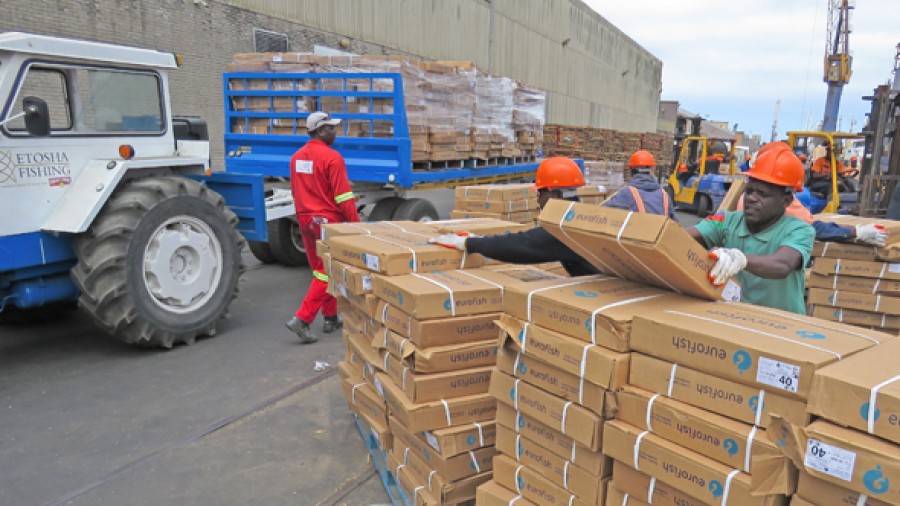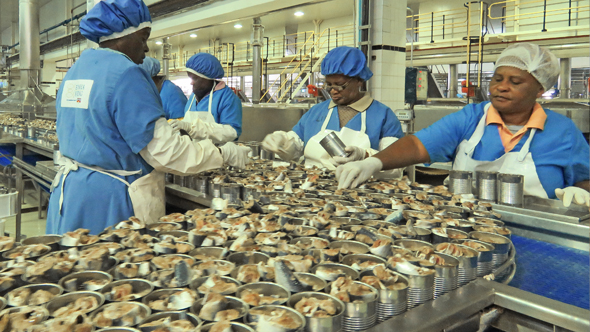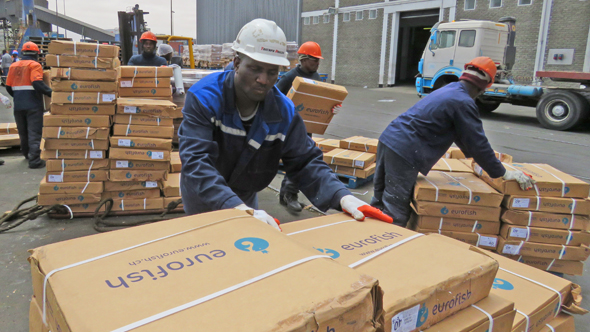
Despite numerous price hikes at the start of
the new year resulting from a weakening Rand and consequently the Namibia
dollar, Etosha Fishing is biting the exchange rate bullet and continues to import
frozen pilchard for value addition at its world-class canning facility in
Walvis Bay. This ensures continued employment of its 650 seasonal workers during
the months of February to mid-April.
During February and March this year nearly
6500 metric tonnes of frozen pilchard will be offloaded at the port of Walvis
Bay. Etosha Fishing plans to import more frozen pilchard during the course of
the year, as it has been doing since 2010, should the exchange rate remain
stable.
“The dramatic drop in the exchange rate has
put the company under tremendous financial pressure, but we remain committed to
sustaining jobs at our canning facility, which can only be done by importing frozen
pilchard. Even if it means the company breaks even,” says Etosha Fishing MD
Pieter Greeff. He explains that it is not only the cost of the imported frozen pilchard
that has increased significantly in recent times, but also all products
required to can the fish, e.g. the cans and paste, which are also imported.
The significance of the pilchard imports
becomes clear when one considers that during their period of employment,
seasonal workers are not only paid a basic wage, but also enjoy benefits such
as overtime, pension fund, housing allowance and a production bonus. “We cannot
take this away from these families,” Greeff notes.

He adds that during these tough economic
times many Namibians rely on basic foodstuffs to sustain their families. Canned
fish is not only rich in Omega 3 fatty acids, but is also an ideal source of
protein and an excellent alternative to meat, which is far more expensive than
fish.
With Namibia’s own pilchard resource under
threat for years now, Etosha Fishing has since 2010 been importing frozen
pilchard annually to ensure the sustainability of the company and Namibia’s own
fishing industry. According to Greeff, total imported pilchard since 2010 is close
to 30 000 metric tonnes. This amounts to more than 60 weeks of additional
employment for seasonal workers during the 2010 to 2016 period.
According to him, the company’s total
allowable catch (TAC) of pilchard and horse mackerel only provides employment
for about 2 to 3 months of the year, from about May to July. Through these
imports jobs are extended from February to April.
Furthermore, the import of frozen pilchard
translates to a trade injection of roughly N$4 million per 1000 tonnes through wages
and services procured in the town of Walvis Bay. This means that roughly N$26
million will be spent in Walvis Bay during February to April as a direct result
of this import. The possibility of more imports, should the economic climate
stabilise, would mean bigger investments in the harbour town’s economy.
Etosha Fishing Corporation is a leading player
in the Namibian fishing industry and considered to be one of the foremost round
can production facilities in the world. It is the proud Namibian home of the
iconic Lucky Star canned pilchard brand and it also cans Namibia’s own horse
mackerel under its own EFUTA Maasbanker brand.
 Photo
caption:
Photo
caption:
Nearly 6500 metric tonnes of frozen
pilchard will be offloaded at the port of Walvis Bay during February and March
this year as part of Etosha Fishing’s bid to sustain jobs at its world-class
canning facility in the harbour town. The company has been importing frozen
pilchard annually since 2010. To date imports total nearly 30 000 tonnes
and have created an additional 60 weeks of employment for seasonal workers over
this period. The town of Walvis Bay also benefits through a trade injection of
roughly N$4 million per 1000 tonnes through wages and services procured in the
town.
 Despite numerous price hikes at the start of
the new year resulting from a weakening Rand and consequently the Namibia
dollar, Etosha Fishing is biting the exchange rate bullet and continues to import
frozen pilchard for value addition at its world-class canning facility in
Walvis Bay. This ensures continued employment of its 650 seasonal workers during
the months of February to mid-April.
Despite numerous price hikes at the start of
the new year resulting from a weakening Rand and consequently the Namibia
dollar, Etosha Fishing is biting the exchange rate bullet and continues to import
frozen pilchard for value addition at its world-class canning facility in
Walvis Bay. This ensures continued employment of its 650 seasonal workers during
the months of February to mid-April.
